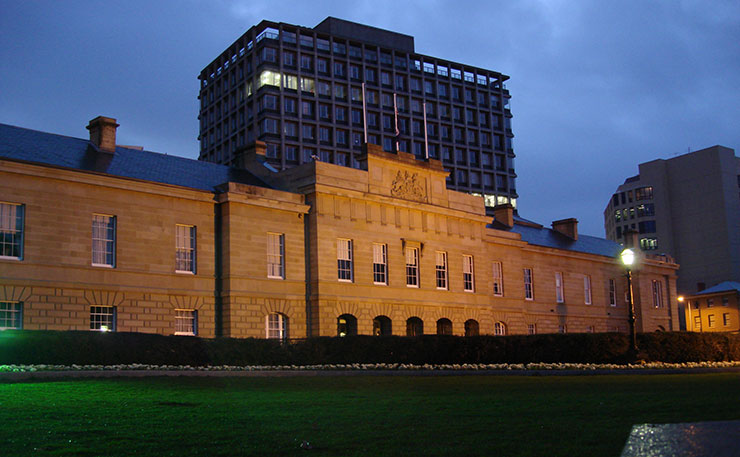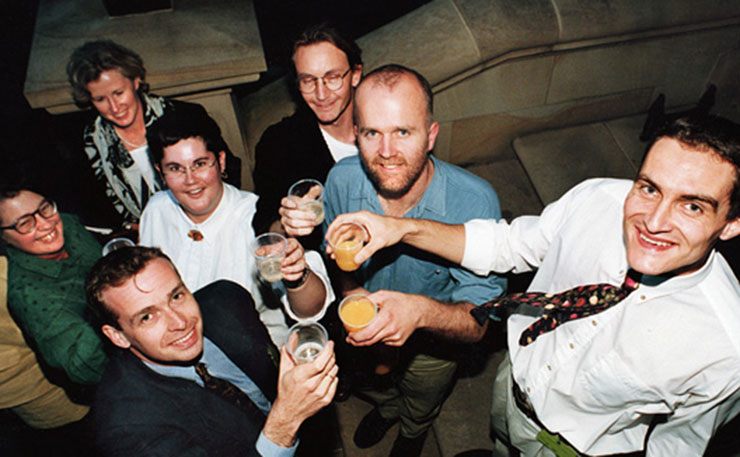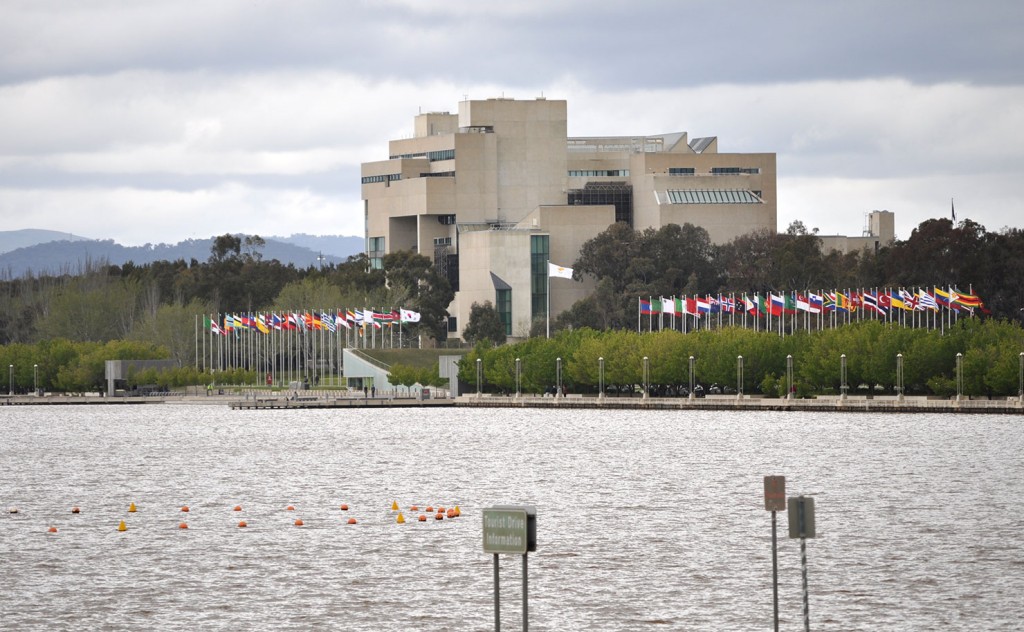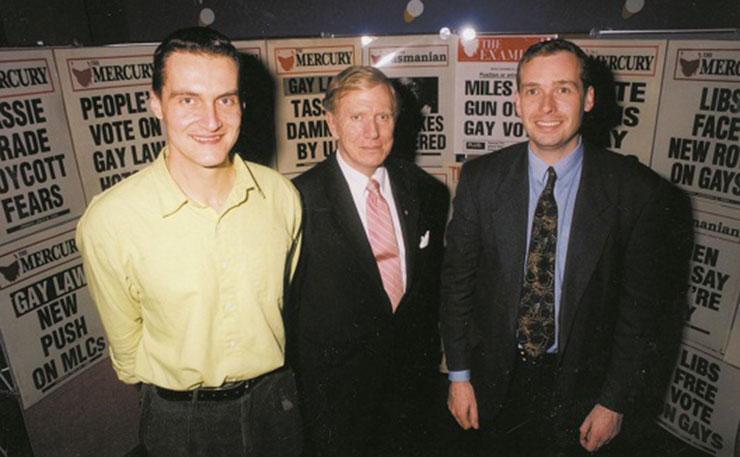Today marks the 20th anniversary of the landmark UN decision Toonen v Australia, against Tasmania’s former anti-gay laws. The State was the last to decriminalise homosexuality, which had a maximum penalty of 21 years in jail.
The Tasmanian Upper House of the 1990s put up heavy resistance to gay law reform, so Nick Toonen, on behalf of the Tasmanian Gay and Lesbian Rights Group (TGLRG), took a case to the UN Human Rights Committee on the very first day it was possible: 25 December 1991.
Two and a half years later, on 11 April 1994, Toonen and the TGLRG announced that the UN Human Rights Committee had found Tasmania’s laws criminalising homosexuality to be in breach of Australia’s obligations under the International Covenant on Civil and Political Rights.
The 20th anniversary of this landmark decision is an excellent opportunity to consider the impact of the Tasmanian UN decision and the progress that has been made on the issues it touched on.
The most obvious impact was in Tasmania. By December 1994 the Federal Government had responded to the UN case by entrenching the right to sexual privacy in national law, giving advocates an opportunity to appeal to the High Court to have the offending laws invalidated.

(IMAGE: Jorge Láscar, Flickr)
When it seemed certain the Court would do so, the state Liberal Government relented and allowed a free vote. Repeal finally scraped through the Upper House on 1 May 1997.
As well as leading directly to decriminalisation, the momentum produced by the UN decision created the conditions for a rejuvenation of human rights in Tasmania.
By 2003, Tasmania had the nation’s most comprehensive anti-discrimination and relationship laws, leading, in turn, to it being the first state to introduce same-sex marriage laws in 2012.
Public support for such reforms also shifted substantially, from well below the national average before the UN decision, to well above by the early years of this century.
In the words of one American journalist, Tasmania went from being Australia’s Alabama to its Massachusetts in less than a generation.
A key to this transformation was that, for the first time, the UN decision placed LGBTI (gay, lesbian, bisexual, transgender and intersex) discrimination firmly within a human rights framework.
The same message — that LGBTI rights are human rights — had a dramatic impact across Australia.
I’ve already mentioned the federal government’s decision to entrench the right to sexual privacy. On top of this the Tasmanian decision provided the foundation for further successful UN cases about the recognition of same-sex relationships, including Young v Australia.
This human rights mandate was critical when the Australian Government moved to recognise same-sex interdependent relationships under John Howard and then same-sex de facto relationships under Kevin Rudd.
Just as importantly, the Tasmanian decision changed how we discuss anti-gay discrimination in Australia. Prior to 1994 the dominant raison d’etre for removing laws that discriminated against gay men was HIV prevention.
While that argument was valid, it tended to medicalise LGBTI people. Almost overnight the LGBTI discrimination debate was transformed by the Tasmanian UN decision, into the kind of unabashed call for equal human rights which has been at the centre of every gay law reform campaign since.

Perhaps most dramatic of all has been the impact of the Tasmanian UN decision around the world. The Tasmanian decision was the first time the UN had recognised the equal rights of LGBTI people.
When the Indian High Court overruled that country’s anti-gay laws in 2009 it was on the basis of the Tasmanian decision.
When UN Secretary-General Ban Ki Moon successfully urged the President of Malawi to release men gaoled for being gay, he cited the Tasmanian decision.
In 2011 the UN Human Rights Commissioner, Navi Pillay, described the Tasmanian decision as “a watershed with wide-ranging implications for the human rights of millions of people”.
But we shouldn’t let the many positive impacts of the Tasmanian UN decision blind us to what still remains to be done.
While other Western countries achieve marriage equality, successive Australian parliaments have thus far failed to allow same-sex couples to marry.
Clearly, the idea of LGBTI human rights, established so clearly in the Tasmanian decision, is not yet strong enough to trump old dogmas and prejudices.
The positive outcomes from the Tasmanian decision contrast with how the Australian Government has failed to act on most subsequent UNHRC decisions (which are legally unenforceable unless they are enacted in Australian law, and therefore all-too-easy to ignore).
A new human rights NGO, Remedy Australia, co-founded by Nick Toonen, was launched today to highlight the sorry fact that only 18 per cent of human rights violations recorded against Australia’s name by the UNHRC are remedied, the fourth worst record in the world, and to lobby for greater compliance with UN decisions.
Key to both these human rights problems, and many more, is that Australia has repeatedly failed to adopt a charter of human rights, unlike every other Western country. The Tasmanian case is a reminder of how important it is for our democracy that human rights are guaranteed.
It is also a reminder that Australia already has a de facto charter of rights which, to work effectively, should be “repatriated” so that victims of human rights abuses can have heir cases heard by Australian courts under Australian laws rather than by a UN tribunal on the other side of the world.

Finally, the anniversary of the Tasmanian UN decision should prompt us to consider how easy it is for hard-won global human rights victories to be repudiated.
By enacting highly repressive anti-gay laws, countries like Russia and Uganda have deliberately violated human rights norms established in the Tasmanian case to show their resistance to “Western values”.
Today is a day to celebrate how far the LGBTI community, Tasmania, the nation and the human rights project have come since the UN’s condemnation of Tasmania’s anti-gay laws was announced to the world April 1994.
It is also a day to draw inspiration from that uniquely important decision in the continued battle to protect human rights and dignity around the world.
Donate To New Matilda
New Matilda is a small, independent media outlet. We survive through reader contributions, and never losing a lawsuit. If you got something from this article, giving something back helps us to continue speaking truth to power. Every little bit counts.





